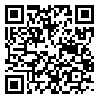Volume 13, Issue 3 (Summer-In Press 2025)
PCP 2025, 13(3): 0-0 |
Back to browse issues page
Download citation:
BibTeX | RIS | EndNote | Medlars | ProCite | Reference Manager | RefWorks
Send citation to:



BibTeX | RIS | EndNote | Medlars | ProCite | Reference Manager | RefWorks
Send citation to:
Rahmatian Dehkordi N, Taghvaee A, Sattari Naeini M. The Effectiveness of Narcotics Anonymous Group Therapy on Impulsivity and the Brain-Behavioral Systems in Individuals with Substance Use Disorders. PCP 2025; 13 (3)
URL: http://jpcp.uswr.ac.ir/article-1-1025-en.html
URL: http://jpcp.uswr.ac.ir/article-1-1025-en.html
1- Department of Psychology, Nae.C., Islamic Azad University, Naein, Iran
2- Department of Psychology, Nae.C., Islamic Azad University, Naein, Iran ,alirezataghvae93@gmail.com
2- Department of Psychology, Nae.C., Islamic Azad University, Naein, Iran ,
Abstract: (62 Views)
Objective: Impulsivity and dysregulated neural circuits characterize substance use disorders, necessitating interventions like Narcotics Anonymous (NA) to enhance self-regulation and recovery outcomes. This study aimed to evaluate the impact of engagement in NA group therapy on the reduction of impulsivity and the modulation of the brain-behavioral systems among individuals diagnosed with substance use disorders (SUDs).
Methods: This quasi-experimental study utilized a pretest-posttest design with a control group to assess the effectiveness of the study intervention. The study population comprised individuals with SUDs who sought support from the Shahrekord Narcotics Anonymous Association, Shahrekord City, Iran, in 2023. A sample of 40 participants was randomly allocated to either the experimental group, which received NA group therapy, or the control group, with 20 participants in each. The experimental group engaged in the NA twelve-step education package, consisting of 12 weekly 90-minute sessions, whereas the control group received standard methadone maintenance treatment. Data on impulsivity and brain/behavioral systems were collected using validated questionnaires administered before and after the intervention. Analysis of covariance (ANCOVA) was employed using SPSS version 23 to analyze the data.
Results: Engagement in NA group therapy resulted in a statistically significant reduction in impulsivity and a significant improvement in the functioning of brain-behavioral systems within the experimental group compared to the control group (P < 0.01).
Conclusions: NA group therapy significantly reduces impulsivity and improves brain-behavioral system functioning, thereby enhancing self-regulation in individuals with SUDs, highlighting its efficacy as a community-based intervention for neurobehavioral outcomes and long-term recovery.
Methods: This quasi-experimental study utilized a pretest-posttest design with a control group to assess the effectiveness of the study intervention. The study population comprised individuals with SUDs who sought support from the Shahrekord Narcotics Anonymous Association, Shahrekord City, Iran, in 2023. A sample of 40 participants was randomly allocated to either the experimental group, which received NA group therapy, or the control group, with 20 participants in each. The experimental group engaged in the NA twelve-step education package, consisting of 12 weekly 90-minute sessions, whereas the control group received standard methadone maintenance treatment. Data on impulsivity and brain/behavioral systems were collected using validated questionnaires administered before and after the intervention. Analysis of covariance (ANCOVA) was employed using SPSS version 23 to analyze the data.
Results: Engagement in NA group therapy resulted in a statistically significant reduction in impulsivity and a significant improvement in the functioning of brain-behavioral systems within the experimental group compared to the control group (P < 0.01).
Conclusions: NA group therapy significantly reduces impulsivity and improves brain-behavioral system functioning, thereby enhancing self-regulation in individuals with SUDs, highlighting its efficacy as a community-based intervention for neurobehavioral outcomes and long-term recovery.
Type of Study: Original Research Article |
Subject:
Substance abuse and dependence
Received: 2025/05/21 | Accepted: 2025/06/28 | Published: 2025/07/11
Received: 2025/05/21 | Accepted: 2025/06/28 | Published: 2025/07/11
| Rights and permissions | |
 |
This work is licensed under a Creative Commons Attribution-NonCommercial 4.0 International License. |




